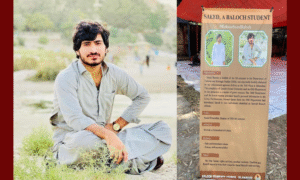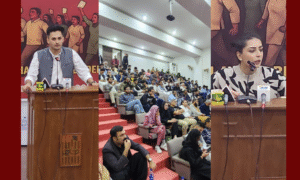Workers of the world – caught in quarantine lockdowns across the globe – will not be able to march on the streets this year to mark International Workers’ Day on May 1. Despite steps taken by various governments to ensure safety and well-being of the working masses, truth is that the global pandemic has only made life more precarious and insecure for these people. This is why we are dedicating the current issue of The Students’ Herald to Student-Worker Solidarity; we believe that no other moment emphasizes the urgency of strengthening such links than a global pandemic.
International Workers’ Day – also known as May Day – is marked to honour the thousands of workers who marched in Chicago in 1886 as part of a campaign to reduce the customary 10-or 12-hour workday to eight hours. The circumstances which compelled the workers in Chicago to march for their rights are not too different from ones faced by workers in Pakistan today; they are not paid minimum wage; they are forced to work in hazardous conditions; are subjected to assault, discrimination and harassment and their livelihoods are permanently dependent upon fluctuations in markets they cannot control.
The COVID-19 pandemic has revealed the ugly face of the disease that has been aggressively engulfing our planet; it has exposed the living conditions and status of working people, and shown us how systematically they have been ripped off all kinds of state and social protections. The largest workforce in Pakistan is informal labour i.e. daily wagers and contractual worker. During this lockdown, when all businesses have ground to a halt, these workers are unable to find any means of putting food on their tables. In the absence of strong trade unions, workers don’t know who to turn to for help and who could ensure survival of their families. The situation of working class communities is unimaginably dire and it is heartbreaking to watch people starve.
Students have also been facing a certain crisis; they are protesting against online classes and the fees being charged by universities in the midst of this pandemic. We are reminded once again of the question of representation, and we find some parallels between the plight of the student and the worker. We feel a void in the absence of institutions and channels for our collective voices. The project of neoliberal economics was always to promote individualistic morals and to denounce our collective heritage. It was backed and aggressively implemented by the authoritarian state apparatus. Trade unions, farmers’ collectives and students unions have been altogether banned, or weakened to such extent that they have no functioning or bargaining capacity. There is an intentionally created void and it gives the illusion that we are powerless and voiceless.
We, the students, must understand that the prevailing education system forms the backbone of this wretched socio-economic system which only reproduces new managers to hold up the status quo. It has become a business and we can see how the private education mafia is behaving in this crisis. The idea of education as the production of new knowledge and thought to lead humanity towards a progressive and prosperous future has long been subdued by the imperatives of profits.
This moment beckons us to cast aside the feeling of dejection we have known for so long. It invites us to see this world from the vantage point of the ‘have-nots.’ Only then will we be able to comprehend the gross injustices of the system that stands on inequality and oppression. We need to see in each other our shared realities and struggles. Only then will we be able to forge the will and the way towards progress and prosperity.
The Students’ Herald News Desk focuses on reporting the latest news regarding student politics and campus updates to you.
The News Desk can be reached at admin@thestudentsherald.com




